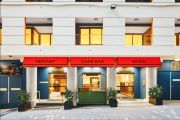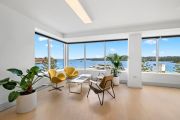COVID has entrenched flexible working and changed the way office space is used, experts say
Despite the obituaries for the traditional CBD office at the beginning of the pandemic, many of those predictions haven’t been borne out. Some businesses and parts of cities around the country are almost back to pre-COVID levels already.
But, says Investa Property Group chief investment officer Peter Menegazzo, not everything will go back to the way it was. He says there are two trends that are here to stay: flexible working and a change in the way space is used.
“The onset of the COVID pandemic had a significant effect on most real estate asset classes,” he said. “The office sector was not immune. The initial market sentiment was extreme, calling the end of the office as we knew it.”
He said that while COVID has undoubtedly had an impact on the way we work, the lasting changes are just the acceleration of trends seen before 2020.
“The recovery to date is demonstrating the calls for the death of office was a severe overreaction,” he said.
Flexible working
Office Space co-founder Naomi Tosic has noticed an uptick in the demand for more flexible workspaces in running her company’s network of shared offices, especially suburban or regional spaces – something also seen in Commercial Real Estate listings data.
“People realise that they don’t necessarily need to do that big trip into the CBD offices, but they could have something, almost a compromise between a local office where they can work in,” she said.
“We’re seeing existing operators, but also new operators, are getting into the game and opening in exciting and really unusual locations.”
Mr Menegazzo said the top three factors that businesses looking for office space considered were location-related: accessibility, centrality and proximity to clients.
Interest in office properties in the greater city regions were up 31 per cent in the January to March quarter of 2021, compared with the same period last year, according to internal data from Commercial Real Estate, while interest in offices outside the major cities increased even more over the same period.
Ms Tosic noticed an increase in businesses and traders turning to serviced offices last year as an alternative to working from home. That trend also showed up in Commercial Real Estate data: demand for serviced offices went up 26 per cent between February and April 2020. And demand from March 2020 to March 2021 went up 21 per cent.
The way space is used
And with so many people working flexibly, offices need to be more than a space to sit at a desk.
“The office has moved beyond being a place to work, to being a place to thrive,” Mr Menegazzo said. “The major change post-COVID is not the amount of space, but how it will be used.”
Mr Menegazzo has noticed a different attitude to the office among his own colleagues, as well as his clients.
“We’ve definitely seen an improvement in the way the business operates when you have people being in the office together, collaborating,” he said.
“It’s easy to run a business from home and you think you can actually do that quite well, but actually it’s all those inorganic things that you don’t necessarily get from looking at screens every day … that human interaction that really stimulates the thinking and gets the best out of people.”
Ms Tosic agrees, saying businesses needed to offer workers more than just an amenity.
“People are realising workplaces need to be more than just a boardroom and a desk and you need to give people a compelling reason to come back to work,” she said.
“(It’s) finding that right balance of somewhere that’s inspirational, somewhere that you can get your good work done, but also have that social aspect addressed.”
Foreign investment interest
While around the world many people are still working from home full time, Australia’s success so far in managing the pandemic has meant investors are keen on our local market, including offices.
“Institutional investors from all around the world are looking at Australia saying this is a really great place to invest,” Mr Manegazzo said. “And, what we’re seeing with that, is a lot of investment inflows into the market and actually a lot of investment occurring, whether that’s on the office side or whether that’s on the build-to-rent side, or more recently, a lot of industrial appetite as well.”
Demand for offices is now picking up again, with Commercial Real Estate data showing demand in the first quarter of this year in the Sydney and Melbourne CBDs is close to the same period in 2020, just before the pandemic. Demand in Brisbane city and north is higher than last year.
Ms Tosic said the shake-up in the office industry made it an exciting time for the sector.
“The last 12 months has forced companies all around the world to reevaluate their existing real estate strategies,” she said. “So, in this time of dramatic real estate flux, I see some great opportunities for the shared office sector.”










